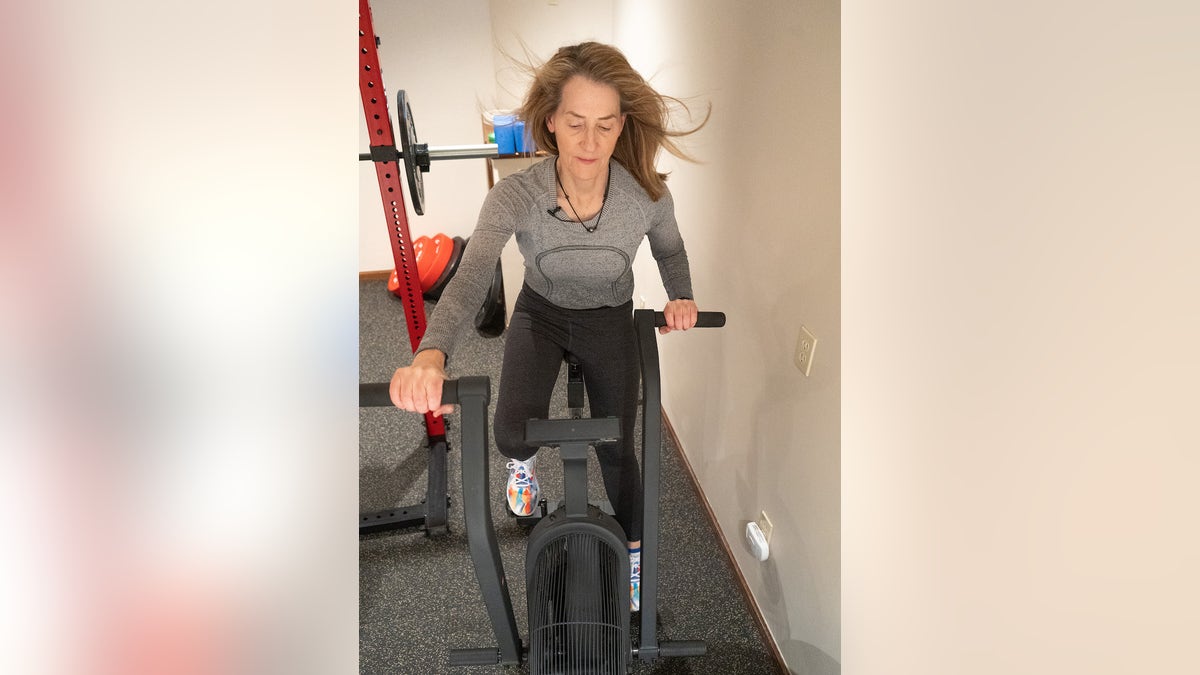6 surprisingly simple ways to keep yourself healthy (hint: sleep is involved)
More than a month into the New Year of 2024, those who haven’t yet made progress on their health and weight-loss resolutions may be feeling a little discouraged.
But experts agree that the number on the scale shouldn’t be the only way to measure a “win.”
Weight alone doesn’t paint a complete picture of a person’s health, according to Dr. Barbara Bawer, a primary care physician at The Ohio State University Wexner Medical Center.
KEEP YOUR WEIGHT-LOSS JOURNEY A SECRET FROM EVERYONE, SAY EXPERTS. HERE’S WHY
Body mass index (BMI) historically has been used by physicians to measure cutoff points that determine whether someone is overweight or obese.
But in June 2023, the American Medical Association (AMA) released a statement calling BMI an “imperfect measure” because it does not directly assess body fat.

Barbara Bawer, M.D., a family medicine physician at The Ohio State University Wexner Medical Center, said checking in with your doctor on any changes to the “BASICS” is important to maintaining overall health. (Ohio State University Wexner Medical Center)
To get a more comprehensive outlook of health, Bawer is encouraging people to get back to the “BASICS” — Brain, Activity, Stomach, Immunity, Checkups and Sleep.
FOODS TO EAT, AND NOT EAT, TO PREVENT CANCER, ACCORDING TO A DOCTOR AND NUTRITIONIST
She has developed a simple list that anyone can use to check in on their health — along with questions to consider for each item.
No. 1 – Brain
“Do you have trouble remembering appointments or important dates? Do you frequently misplace things? Has your SAGE score changed in the past year?”
SAGE (Self-Administered Gerocognitive Exam) is a self-administered test that can spot early signs of dementia, which can be downloaded on OSU’s website.
“If a patient finds that they are more forgetful — or worse, if a member of their family or a friend points things out — this may be evidence that your cognitive health is not as good as it should be,” said Bawer.

Joyce Miller, an OSU patient, plays brain games to keep her mind active. Brain health is one of the “BASICS” that experts at The Ohio State University Wexner Medical Center say is important to maintaining your overall health. (Ohio State University Wexner Medical Center)
In that case, she recommends seeing a doctor for an evaluation.
To strengthen cognitive health, Bawer suggested doing activities like brain games or puzzles.
Other tips to boost brain health include eating a well-balanced diet, exercising regularly, staying well-hydrated, getting good sleep and staying connected with friends, family and the community.
“Poor cognitive status may be due to depression or dementia,” Bawer noted.
Melanie Avalon, an Atlanta-based health influencer, entrepreneur and host of “The Intermittent Fasting Podcast” and “The Melanie Avalon Biohacking Podcast”, said that a myriad of general lifestyle factors can support brain health, “including a nutrient-rich, anti-inflammatory diet and avoidance of environmental toxins.”
No. 2 – Activity
“How active are you? Do you complete 150 minutes of moderate exercise each week? Do you experience any pain when exercising? Do you sit for more than eight hours per day?”
Said Bawer, “A sedentary lifestyle, such as working from home and sitting at a computer for most of that time without getting up, puts you at risk for cardiovascular disease.”
She added that “sitting for long periods of time tightens our muscles and puts more stress on our joints when we do use them.”

Joyce Miller, a patient of Dr. Bawer’s, is diligent about maintaining her health, ensuring she gets the recommended 150 minutes of exercise each week. She also practices healthy habits like eating a balanced diet, getting all recommended screenings and vaccinations, and getting plenty of sleep. (Ohio State University Wexner Medical Center)
To combat this, the doctor suggested setting an alarm every hour that reminds you to get up, use the restroom, walk to another area of the home or step outside (ideally for a walk) to get in more steps and movement.
“Stretching is also important as we age to improve our flexibility as well as our muscle and joint health,” Bawer added.
“A sedentary lifestyle, such as working from home and sitting at a computer for most of that time without getting up, puts you at risk for cardiovascular disease.”
Make sure you’re finding time to exercise regularly, the doctor recommended, while taking note of any new pain you experience during physical activity.
Exercise serves as a beneficial stress for the body that helps to maintain homeostasis, stimulating cellular adaptations for health and longevity, said Avalon.
“These effects include beneficially affecting hormones, boosting the mitochondria, supporting repair and renewal, and helping the body adapt to challenges,” she said.

Barbara Bawer, M.D., has developed a simple list anyone can use to check in on their health, along with questions to consider for each item. (Ohio State University Wexner Medical Center)
Exercise doesn’t have to mean spending hours at the gym, Avalon added.
“You can also increase physical activity by implementing fun movement into your day — run daily errands rather than always choosing delivery services, park far away in the parking lot, take the stairs rather than the elevator, have impromptu dance sessions while house cleaning or get a dog to encourage walks,” she suggested.
No. 3 – Stomach
“Do you have indigestion, stomach pain or bloating? Are your bowel movements regular? Is there blood in your stool? Have you experienced unexplained weight gain or loss?”
Unexplained weight loss, said Bawer, “could be a sign of cancer. Unexplained weight gain may be due to a number of conditions, but this may also point to unhealthy foods going into your body and a sedentary lifestyle.”
THESE ARE THE WORST DRINKS FOR YOUR HEALTH, ACCORDING TO NUTRITIONISTS
Not having regular bowel movements can indicate that the motility of the gut is slow, which can be due to lack of activity, poor nutrition or poor water intake — and can lead to inflammation and disease development, the doctor said.
“Indigestion can be a sign of GERD (gastroesophageal reflux disease) or esophagitis, both of which may need medication to help us treat them,” Bawer noted.

Ignoring GI issues, digestive distress or bouts of irritable bowel syndrome can be dangerous, experts said. (iStock)
Other potential triggers include food intolerances or sensitivities, functional abdominal disorders or GI illnesses like diverticulitis, ischemia, bowel obstruction or ulcers.
Avalon pointed out the danger of ignoring GI issues, digestive distress or bouts of irritable bowel syndrome.
“Taking such concerns seriously can potentially improve health radically,” she said. “Healthy, pain-free digestion and regular bowel movements can signify proper digestion of nutrients and a flourishing microbiome, all of which intrinsically support the body’s overall health.”
No. 4 – Immunity
“Do you get sick often or get frequent infections? Does it take you longer than others to recover from illness? Have you had recommended vaccinations?”
Bawer told Fox News Digital, “Your immune system may not be up to par if you are not exercising, eating well or getting enough sleep, and this can lead to frequent infections.”
Genetic conditions or autoimmune conditions can also lead to a low immune system.
THE 11 BEST HIGH-FIBER FOODS TO INCORPORATE INTO YOUR DIET
“Strengthen your immunity by getting the nutrients you need through a balanced diet and stay up to date on your vaccinations,” Bawer advised.
Avalon agreed that a healthy immune system starts with diet.
A March 2023 study found that the characteristics of ultra-processed foods can promote chronic inflammation in the body and encourage non-communicable diseases, she pointed out.
“Choose a fresh, whole-foods diet to help create a cornerstone for immunity.”
“Choose a fresh, whole-foods diet to help create a cornerstone for immunity,” Avalon recommended. “Focus on ample protein such as grass-fed meat, organic poultry, and low-mercury wild-caught fish, while eating the rainbow of produce, to acquire an array of vitamins and phytonutrients that support immunity.”
No. 5 – Checkups
“Have you completed an annual checkup with your primary care physician? Do you have any health concerns? Are you up to date on all recommended screenings?”
Staying current with physical exams — even if you don’t have any symptoms — can help catch diseases before they fully develop or even start, noted Bawer.
Doctors can also provide lifestyle modifications to consider so that you avoid developing diseases.

Barbara Bawer, M.D. (left), a family medicine physician at The Ohio State University Wexner Medical Center, said there are many clues to evaluating overall health and that maintaining the “BASICS” — brain, activity, stomach, immunity, checkups and sleep — provides a healthy foundation for the future. (Ohio State University Wexner Medical Center)
“Many times during annual check-ups, when we ask the patient something, get vitals or do labs, we find an issue that is brewing, but the patient had no symptoms and would not have known otherwise,” she said.
Avalon echoed the importance of annual in-person checkups.
“An expert third-party opinion can provide an unbiased overview of one’s health, find potentially undiagnosed issues and provide motivation to continue on one’s health journey,” she said.
No. 6 – Sleep
“Do you get seven to nine hours of sleep each night? Are you tired during the day? Do you often need a nap to get through the day?”
“Poor sleep is linked to cardiovascular disease, cognitive decline/dementia, poor immunity, mood changes like depression and anxiety, and pain receptors firing inappropriately, among other things,” said Bawer.
CLICK HERE TO SIGN UP FOR OUR HEALTH NEWSLETTER
Snoring that interrupts sleep can be a sign of undiagnosed sleep apnea, she warned, which needs treatment with a CPAP machine.
“Most people need seven to eight hours of sleep to get restorative sleep, even if they think they can function on less,” said Bawer.

Joyce Miller, an OSU patient, avoids screens before going to sleep and keeps consistent bedtimes on a daily basis. Experts at The Ohio State University Wexner Medical Center say sleep is undervalued as a medical need and can have a major impact on overall health. (Ohio State University Wexner Medical Center)
On the other hand, oversleeping can be a sign of depression.
Calling sleep the “basic foundation of health and wellness,” Avalon recommended cultivating a consistent wind-down routine and a dark, cool sleeping environment.
CLICK HERE TO GET THE FOX NEWS APP
“For more advanced hacks, try wearing blue-light blocking glasses at night or using a cooling mattress,” she suggested.
“Modern wearables or smart mattresses can also be used to evaluate and track one’s sleep quality.”
For more Health articles, visit www.foxnews.com/health.




